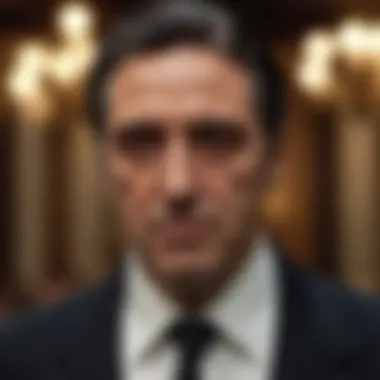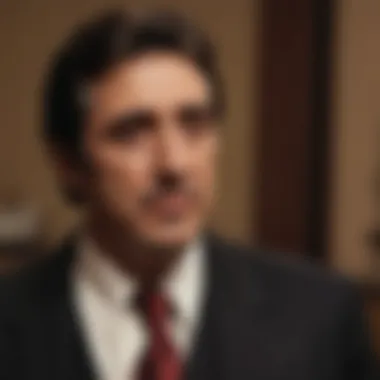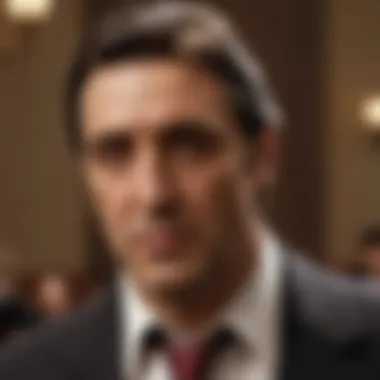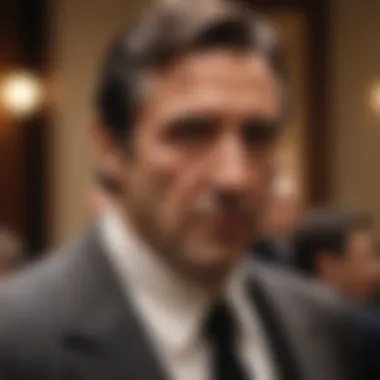Unveiling Al Pacino's Masterful Portrayal in The Godfather: A Cinematic Analysis


Overview of Al Pacino's Performance in The Godfather
In this comprehensive analysis, we delve deeply into the portrayal of Al Pacino's character in the timeless classic, The Godfather. The iconic film revolutionized cinema, and Pacino's performance played a pivotal role in its enduring legacy.
Character Study: Michael Corleone
Al Pacino's portrayal of Michael Corleone goes beyond mere acting; it embodies a masterclass in nuanced performance. From his transformation from a reluctant outsider to a formidable mafia boss, every subtle gesture and expression adds layers to the character's complexity.
Impact on Cinematic Landscape
Pacino's interpretation of Michael Corleone not only captivated audiences but also left an indelible mark on the cinematic landscape. His portrayal set a new standard for character depth and psychological realism in film, influencing generations of actors and filmmakers.
Cinematic Significance
The Godfather not only established itself as a cinematic masterpiece but also served as a launching pad for Al Pacino's illustrious career. The film's success and critical acclaim largely hinge on Pacino's magnetic portrayal, solidifying his status as a legendary actor.
Legacy and Influence
Decades after its release, The Godfather continues to resonate with audiences worldwide, largely due to Al Pacino's unforgettable performance as Michael Corleone. His portrayal remains a benchmark for character study and remains a touchstone for aspiring actors and film enthusiasts.
Al Pacino's performance in The Godfather stands as a pinnacle of cinematic excellence, a portrayal that continues to reverberate through the annals of film history. The depth and intricacy with which Pacino embodies the character of Michael Corleone showcases a masterful display of acting prowess. This section aims to dissect the nuances of Al Pacino's performance, shedding light on the character transformation, psychological complexities, and enduring impact on popular culture.


Al Pacino: An Acting Legend
Early Life and Career Beginnings
Al Pacino's journey as an acting legend traces back to his humble beginnings, marked by a tenacious pursuit of his craft. Born in East Harlem, New York City, Pacino's early life instilled in him a resilience and passion that would later define his illustrious career. His immersion in the world of acting from a young age laid the foundation for his exceptional talent and marked dedication to the art form.
Rise to Prominence
The ascent of Al Pacino to cinematic stardom was not devoid of challenges and hardships. His gradual rise to prominence in the realm of acting was propelled by a relentless commitment to honing his skills and pushing the boundaries of his craft. With each role, Pacino carved a path towards excellence, captivating audiences with his emotive performances and impeccable portrayal of a diverse range of characters. His ability to etch his name in the annals of acting history through roles that resonate with audiences worldwide is a testament to his enduring legacy.
The Godfather: A Cinematic Masterpiece
The significance of The Godfather as a cinematic masterpiece in this article lies in its revolutionary approach to storytelling and character development. The film, directed by Francis Ford Coppola, redefined the gangster genre with its focus on the intricacies of power, family dynamics, and moral ambiguity. Through masterful storytelling techniques and compelling performances, The Godfather became a hallmark in cinematic history, influencing generations of filmmakers and earning critical acclaim. The meticulous attention to detail in crafting a morally complex narrative sets The Godfather apart as a timeless classic that continues to resonate with audiences worldwide.
Background of The Godfather
Francis Ford Coppola's Vision
Francis Ford Coppola's vision for The Godfather was rooted in a desire to delve deep into the intricacies of human nature, power dynamics, and the consequences of choices. His meticulous approach to storytelling, characterized by attention to detail and emphasis on character development, elevated the film beyond a mere crime drama. By infusing the narrative with themes of loyalty, betrayal, and redemption, Coppola created a cinematic experience that transcended its genre, earning widespread acclaim and solidifying his reputation as a visionary filmmaker.
Adaptation of Mario Puzo's Novel
The adaptation of Mario Puzo's novel was a crucial element in bringing The Godfather to life on the silver screen. Puzo's rich tapestry of characters and complex, interwoven plotlines provided the foundation for a cinematic masterpiece. Coppola's careful interpretation of Puzo's work ensured that the essence of the novel remained intact while making necessary adjustments for the visual medium. The seamless transition from page to screen highlighted the timeless themes of family, power, and legacy, captivating audiences and critics alike.


Character Dynamics in The Godfather
The Corleone Family
At the heart of The Godfather lies the intricate dynamics of the Corleone family, a powerful mafia dynasty grappling with internal conflicts and external threats. The portrayal of family loyalty, honor, and betrayal adds depth to the narrative, illuminating the complexities of human relationships in the world of organized crime. The Corleone family serves as a microcosm of larger societal structures, showcasing the interplay of tradition, ambition, and moral compromise.
Michael Corleone's Arc
Michael Corleone's character arc in The Godfather is a testament to the film's exploration of power, corruption, and redemption. From a reluctant outsider to a ruthless heir apparent, Michael's transformation mirrors the shifting tides of the criminal underworld. His internal struggle between duty and morality encapsulates the core themes of the film, challenging audience perceptions and sparking debates on the nature of power and its corrupting influence.
Al Pacino's Commitment to the Role
Preparation and Method Acting
Al Pacino's preparation for the role of Michael Corleone involved in-depth research, intense character analysis, and immersive experiences to embody the psyche of a mafia scion. His commitment to method acting allowed him to tap into the emotional depth and complexity of the character, delivering a nuanced performance that resonated with audiences. By immersing himself in the role, Pacino brought authenticity and intensity to Michael's persona, elevating the character beyond stereotypes and cliches.
Embodying Michael Corleone
Embodying the essence of Michael Corleone required Al Pacino to channel a mix of vulnerability and ruthlessness, capturing the duality of a man torn between his family obligations and personal convictions. His ability to convey subtle shifts in demeanor, from quiet contemplation to explosive decisiveness, underscores the inner turmoil of a reluctant leader thrust into a world of violence and deceit. Pacino's nuanced portrayal not only anchored The Godfather but also set a new standard for character depth and psychological realism in cinema.
Analyzing Al Pacino's Performance


In this section, we will deconstruct and examine Al Pacino's performance in The Godfather with meticulous detail. It is essential to dissect Pacino's portrayal as it serves as a cornerstone in the cinematic landscape, influencing future generations of actors and filmmakers. By delving into the intricacies of his acting choices and nuances, we can unravel the layers of complexity that he brought to the character of Michael Corleone. This analysis will highlight key elements such as Pacino's commitment to the role, his delivery of dialogue, and the emotional depth he infused into each scene, offering readers a profound insight into the significance of his performance.
Character Transformation
From War Hero to Mafia Kingpin
The transformation of Michael Corleone from a war hero to a ruthless mafia kingpin is a pivotal aspect of Al Pacino's performance in The Godfather. This evolution showcases Pacino's range as an actor and his ability to portray a character undergoing drastic internal changes. The shift from a reluctant outsider to a cunning patriarch highlights Pacino's skill in portraying nuanced character development. The juxtaposition of Corleone's moral ambiguity and ruthless pragmatism adds depth to the character, making his journey from hero to anti-hero a compelling narrative arc. Pacino's portrayal of this transformation resonates with audiences due to its authenticity and the inherent conflicts it presents, making it a critical element in understanding the character's trajectory in the film.
Psychological Depth and Complexity
Internal Struggles and Moral Dilemmas
The exploration of internal struggles and moral dilemmas forms the crux of Al Pacino's performance in The Godfather. Pacino delves deep into the psyche of Michael Corleone, showcasing the character's conflicting emotions and turbulent inner battles. By navigating through Corleone's moral ambiguity and ethical quandaries, Pacino adds layers of complexity to the character, elevating the performance beyond a simple mobster archetype. The portrayal of Corleone's internal conflicts allows viewers to empathize with his predicament and ponder the consequences of his choices, creating a psychologically rich and multifaceted character that transcends the standard conventions of the gangster genre.
Impact on Pop Culture
Enduring Legacy of Michael Corleone
The enduring legacy of Michael Corleone in popular culture solidifies Al Pacino's performance as a timeless and iconic portrayal in cinematic history. Pacino's nuanced depiction of the character has left an indelible mark on the film industry, inspiring future generations of actors and filmmakers. The character of Michael Corleone has become synonymous with complex anti-heroes, influencing numerous cinematic portrayals of morally gray protagonists. Pacino's embodiment of Corleone's legacy extends beyond the confines of The Godfather, permeating popular culture and serving as a touchstone for character studies in modern storytelling. By examining the lasting impact of Michael Corleone, we can understand the profound cultural significance of Pacino's performance and its enduring relevance in contemporary media.
Legacy and Influence
In delving into the analysis of Al Pacino's performance in The Godfather, it becomes paramount to consider the significant aspect of Legacy and Influence. This section encapsulates the enduring impact left by Pacino's portrayal of Michael Corleone on the realm of cinematic artistry and narrative storytelling. The legacy of his performance transcends generations, resonating with audiences across time and space. Pacino's influence as an actor and character depiction within The Godfather continues to shape the landscape of modern cinema, setting a benchmark for nuanced character development and psychological depth. By exploring the legacy and influence of Al Pacino's iconic role, this article aims to shed light on the everlasting reverberations of his performance within the intricate tapestry of cinematic history.
The Godfather Effect
Pacino's Influence on Future Generations
Delving into Pacino's Influence on Future Generations, one cannot overlook the profound impact his portrayal of Michael Corleone has had on aspiring actors and filmmakers alike. Pacino's ability to embody the multifaceted layers of his character, showcasing internal struggles and moral dilemmas with authenticity and depth, has served as a masterclass for generations to come. The magnetic presence he brought to the screen and the emotional resonance of his performance has set a standard for aspiring actors to strive towards. Pacino's influence extends beyond mere imitation, inspiring future generations to seek out complex, compelling roles that challenge conventional norms of character portrayal. By dissecting Pacino's Influence on Future Generations, this article aims to showcase the profound effect his performance in The Godfather has had on shaping the ethos of cinematic storytelling and character depiction.















